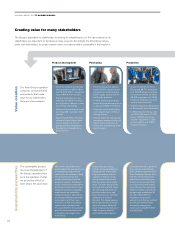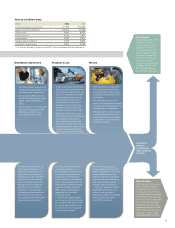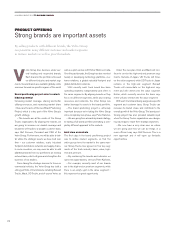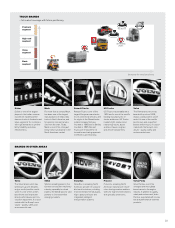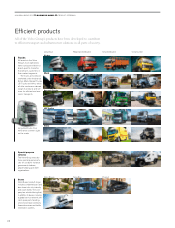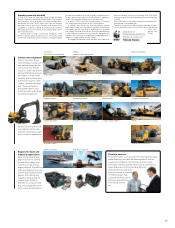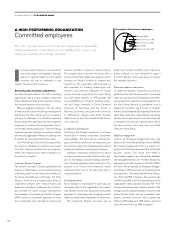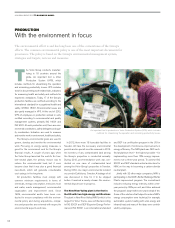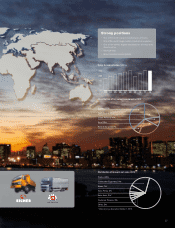Volvo 2012 Annual Report Download - page 34
Download and view the complete annual report
Please find page 34 of the 2012 Volvo annual report below. You can navigate through the pages in the report by either clicking on the pages listed below, or by using the keyword search tool below to find specific information within the annual report.
research institutes in areas of special interest.
The program aims to provide the Group with a
picture of important collaborative partners and to
increase the Group’s visibility to students and
researchers. The cooperation with universities is
also important for creating relationships with
students and potential employees to secure
access to future competence. The Volvo Group
has eight talent partners in APP globally: EM
Lyon and INSA Lyon in France, Tsinghua Univer-
sity and Tongji University in China, Chalmers
University of Technology and the School of
Business, Economics and Law at the University
of Gothenburg, Sweden and North Carolina
State University and Pennsylvania State Univer-
sity in the U.S.
Competence development
Investing in the Group's employees is a funda-
mental part of staying competitive, sustainable
and profitable. The Volvo Group’s training pro-
grams are offered at all levels for employees, and
the activities range from traditional and e-based
training to individual coaching and mentoring.
Individual competence development is based
on a personal business plan, which provides sup-
port for translating corporate strategic objectives
into individual objectives and contribution. The
purpose is to ensure that employees clearly
understand their role in the team and what is
expected of them.
Developing talents
Every manager is responsible for assessing and
developing talent in the organization. The Leader-
ship Pipeline provides the Group with a structured
approach to developing and preparing present
leaders as well as potential leaders for future roles.
The Leadership Pipeline has been set up
ncreased global presence, new products,
new technologies, demographic changes
and more rapid fluctuations in the global
economy will lead to challenges in the
supply of expertise and resources.
Attracting and retaining competence
The Volvo Group's ambition is to offer interesting
opportunities and a unique company culture that
help us attract and retain the best people, whoever
they are and wherever we do business.
Without engaged employees, who are willing
to take an active part in the Group’s development
and future, the Volvo Group will not succeed in
pursuing its strategies. It is therefore important
that we attract the right expertise and competent
engineers to continue the development of envi-
ronmentally enhanced products. The Volvo Group
regularly maps the strategic competence needs,
and annually aggregate findings on a Group level
to identify the most important future needs.
The Volvo Group's Code of Conduct prescribes
the minimum standard our emplyees can expect
from their employer, but also their own responsi-
bilities. All employees are offered education on
the policy's principles.
Academic Partner Program
The number of people in Europe graduating with
degrees in mathematics, science and technology
is declining, and this trend may have an effect on
the future competitiveness of Europe. The Volvo
Group is involved in a comprehensive series of
cooperative ventures with research bodies and
academic institutions to advance the technolo-
gies needed for future product development.
One example is the Academic Partner Program
(APP), which is a systematic approach for long-
term cooperation with selected universities and
jointly with research institutes and is based on
global research. It is also designed to support
the Volvo Group’s culture and values as well as
the strategic objectives.
Diversity enhances innovation
To create the dynamics required to succeed at a
global level the Volvo Group needs to recruit and
retain a broad spectrum of employees with differ-
ent backgrounds, experience and perspectives. In
the Volvo Group diversity is considered to be a
catalyst for innovation and a source of competi-
tiveness and profitability. By expanding the knowl-
edge base, skills and understanding, the Group
becomes more responsive to customer needs and
it strengthens the Group's market position. Diver-
sity and inclusion have long been pri oritized
within the Volvo Group.
Employee engagement
In 2011, an Employee Engagement Index was
added to the Volvo Group Attitude Survey (VGAS).
By including engagement there is a clearer con-
nection to the Group’s wanted position, culture and
business success. The results from VGAS is
benchmarked against an international database
with data gathered from over 14 million employees,
representing over 80 countries. In the 2012 VGAS,
the Volvo Group reached an Employee Engage-
ment Index of 76%, which was on the same level as
the year before. This means that the Volvo Group is
one of the top 25% companies. The response rate
in VGAS was 92%. In 2012 a measurement on the
organization's status was also included, PEI – Per-
formance Excellence Index, which measures if the
company has the right prerequisites to perform and
deliver, but also factors such as cooperation, clear
targets, customer service as well as quality and
efficiency. PEI ended up at 74%, which is good, but
below the level of the top 25% companies.
A HIGH-PERFORMING ORGANIZATION
Committed employees
The Volvo Group's vision is to become the world leader in sustainable
transport solutions. A deciding factor in fulfilling this vision is our
employees and their knowledge and skills.
Europe 54%
North America 17%
South America 6%
Asia 20%
Other countries 3%
Geographic distribution of employees
I
A GLOBAL GROUP 2012 BUSINESS MODEL
30


